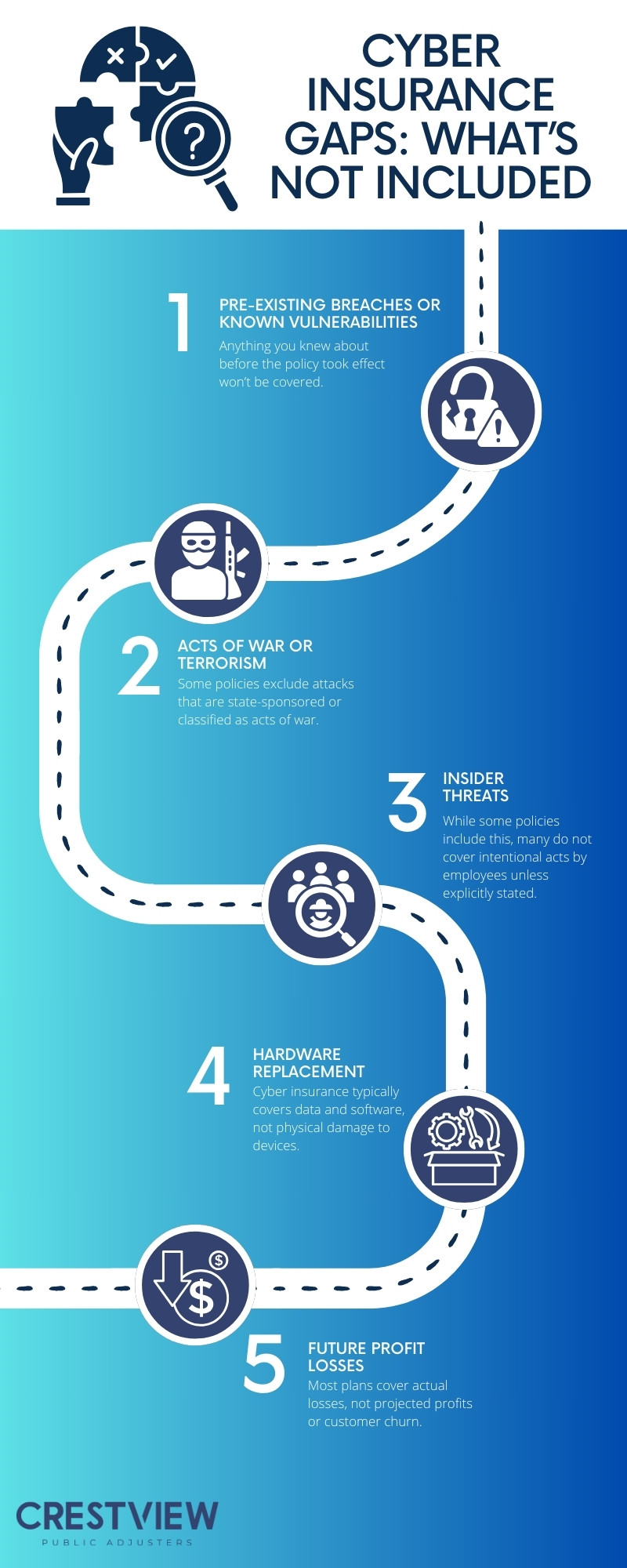Key Points:
- Cyber insurance protects small businesses from financial loss due to cyberattacks, data breaches, and system failures.
- Policies often cover data recovery, legal fees, ransom payments, and business interruption costs.
- Understanding what is and isn’t covered helps business owners choose the right plan and avoid coverage gaps.
Cyber insurance for small business owners provides financial protection from the fallout of cyber incidents such as data breaches, ransomware, or denial-of-service attacks. It helps cover the costs associated with recovering from cybercrime, including forensic investigations, legal liabilities, and lost income.
As cyber threats rise, so does their cost. According to a 2023 report from IBM, the average cost of a data breach globally reached $4.45 million. For small businesses, even a fraction of that can be catastrophic. That’s why cyber insurance is not just a “nice-to-have” — it’s a strategic necessity.
Why Do Small Businesses Need Cyber Insurance?
Many small business owners assume they’re too small to be targeted. Unfortunately, that couldn’t be further from the truth. In fact, small and mid-sized businesses account for 43% of cyberattacks, according to a study by Verizon. Hackers see these businesses as low-hanging fruit — typically underfunded in security, underprepared in recovery.
Cyber insurance serves as a crucial financial safety net. It doesn’t stop the attack, but it helps you survive the aftermath.
Some specific reasons small businesses need cyber coverage:
- Limited internal resources for cybersecurity defense and incident recovery.
- High dependency on digital systems — from online sales to customer databases.
- Strict data protection regulations like GDPR or HIPAA that impose heavy penalties for breaches.
Cyber liability insurance ensures that when the unexpected hits, your business has a lifeline.
What Does Cyber Insurance Typically Cover?
Understanding the actual scope of cyber insurance is key. It’s not one-size-fits-all. Coverage varies, but comprehensive plans usually include both first-party and third-party protections.
Here’s what many cyber insurance policies typically cover:
First-Party Coverage:
- Data recovery and restoration after a cyberattack.
- Business interruption losses due to network downtime.
- Cyber extortion payments, like ransomware demands.
- Incident response costs, including forensic investigations and crisis communication.
Third-Party Coverage:
- Legal defense fees and settlements if customers sue over a data breach.
- Regulatory fines and penalties for non-compliance (if allowed by law).
- Costs to notify customers affected by the breach.
- Reputation management and public relations support.
This scope of coverage is what makes cyber insurance for small business owners such a smart investment — especially when customer trust and business continuity are on the line.
What Is Not Covered by Cyber Insurance?
Just as important as knowing what’s covered is understanding what isn’t. Exclusions vary by policy, but here are some common things not covered:

That’s why it’s essential to read the fine print and work with professionals who can interpret your policy in plain English.
How to Choose the Right Cyber Insurance Policy
With so many options out there, finding the right cyber insurance for small business owners can be overwhelming. You don’t just want the cheapest policy — you want the one that fits your specific risks and operations.
Start by assessing your business’s digital footprint:
- How much sensitive data do you store?
- Do you use third-party software or cloud providers?
- Are your employees trained in cybersecurity best practices?
Then consider these when evaluating insurance options:
- Coverage limits — Are they high enough to cover worst-case scenarios?
- Deductibles — Can your business afford to pay them?
- Response time — How quickly does the insurer provide support after a breach?
- Claims process — Is it simple, transparent, and reliable?
It also helps to work with a broker or public adjuster experienced in cyber policies. They can help you navigate the maze of options and fine-tune a plan tailored to your business.
What Are the Benefits of Having Cyber Insurance?
A cyber policy isn’t just about risk transfer — it’s about business survival and reputation protection. Here’s how it helps in practical terms:
- Speedy recovery from incidents that would otherwise shut you down.
- Expert guidance through every step of incident response and regulatory compliance.
- Customer reassurance — showing clients and partners that you take security seriously.
- Peace of mind, knowing that your livelihood won’t be destroyed by a single click on a phishing link.
Cyber insurance doesn’t just cover losses — it empowers businesses to bounce back faster and stronger.
What Types of Businesses Should Have Cyber Insurance?
Virtually any business that uses a computer, stores data, or has an online presence is a potential target — and a candidate for cyber insurance. But some industries face elevated risks.
Industries that benefit most from cyber coverage:
- Healthcare providers (HIPAA regulations and sensitive medical data)
- Retail and e-commerce (payment processing, personal customer data)
- Legal and accounting firms (confidential client records)
- IT service providers (data stored on behalf of clients)
- Marketing agencies (third-party platforms and cloud tools)
Even local service businesses — plumbers, electricians, cleaners — often store customer info in digital form. If that data is breached, cyber liability insurance could be your only safety net.
How Much Does Cyber Insurance Cost?
The cost of cyber insurance for small business owners varies based on several factors:
- Size of the business and annual revenue
- Type and volume of data handled
- Industry risks
- Cybersecurity measures in place
- Coverage limits and deductibles
On average, small businesses in the U.S. pay anywhere between $500 to $2,500 per year for cyber insurance. While it may seem like a hefty price upfront, compare that with the potential cost of a breach — fines, lawsuits, downtime — and the investment becomes easy to justify.

How Can Public Adjusters Help with Cyber Insurance Claims?
Filing a cyber insurance claim can be as stressful as the breach itself. The process often involves technical documentation, legal language, and insurer negotiations — all while you’re trying to get your business back online.
This is where public adjusters step in.
They represent policyholders, not the insurance company. Their job is to:
- Analyze the cyber event and assess financial impact
- Prepare and file comprehensive claim documentation
- Communicate with the insurer on your behalf
- Maximize the claim payout so your business can recover fully
Having a public adjuster handle your cyber insurance claim can make a world of difference — especially when you’re already overwhelmed and focused on operational recovery.
Protect Your Business. Get Expert Help with Cyber Insurance Claims.
Work with Crestview Public Adjusters to navigate your cyber insurance claim with confidence.
Whether you’re in New York, Florida, or New Jersey, our team helps small businesses like yours recover fully after a cyberattack. We don’t sell insurance — we fight to get you the maximum payout from your existing policy.
Don’t leave your cyber recovery to chance. Contact Crestview Public Adjusters today and take the stress out of your cyber insurance claim.

